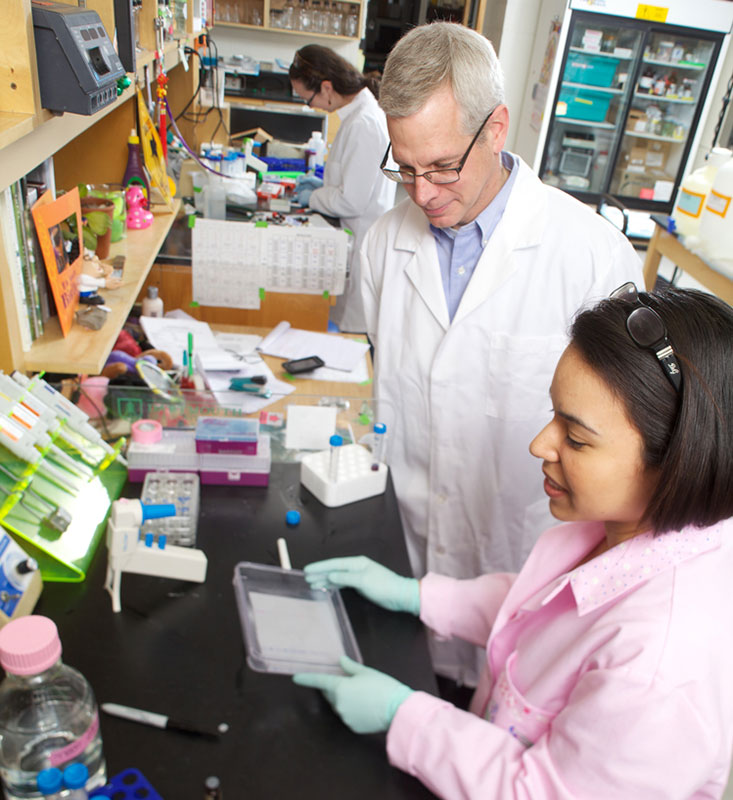For Release: October 7, 2013
Contact: Derik Hertel, (603) 650-1211 or Derik.Hertel@Dartmouth.edu
$18 Million NIH Grant Accelerates Geisel's Translational Research
"Game-Changer" Award Puts Dartmouth Among Elite Research Universities in America
Hanover, NH—Dartmouth has been awarded $18 million in the highly competitive National Institutes of Health's Clinical and Translational Science Award (CTSA) program, joining an elite group of U.S. research universities conducting translational research.
The five-year grant will be matched with an additional $20 million from Dartmouth's Geisel School of Medicine and the Dartmouth-Hitchcock health system, for a total investment of $38 million in translational science at Dartmouth College, Geisel School of Medicine, Dartmouth-Hitchcock, and the Veterans Affairs Medical Center in White River Junction, Vt.
Translational Research at Geisel
The NIH CTSA grant to Dartmouth builds on a rich body of translational work already underway at Dartmouth's Geisel School of Medicine. Some examples include:
- Cellular immunologist Randy Noelle and his team are working on regulating the immune system in order to better treat immune-related diseases like cancer, lupus, and rheumatoid arthritis.
Read more » - Epidemiologist Margaret Karagas is leading an investigation of the effects of exposure to toxic metals in drinking water.
Read more » - Computational geneticist Jason Moore works across disciplines with epidemiologists, clinicians and biostatisticians in order to take large, complex data sets and translate them into a meaningful picture of population health and disease.
Read more » - Geneticist Michael Whitfield is discovering how gene expression signatures can accurately identify scleroderma patients who will positively respond to a particular therapy that might be harmful to others.
Read more » - Researchers Lilian Kabeche and Duane Compton found that the protein cyclin A acts as a master controller to ensure the faithful segregation of chromosomes during cell division. The discovery could lead to new treatments for cancer.
Read more » - Radiology professor Periannan Kuppusamy found that dying heart cells—such as those damaged in a heart attack—still contain enough oxygen for metabolism, and additional short-term spikes of oxygen keep the cells alive and active.
Read more »
Translational research brings laboratory discoveries to clinical practice, transforming scientific and therapeutic breakthroughs into new treatments, cures, and improved health outcomes.
"This $38 million public and institutional investment is a game-changer for Dartmouth. It will transform Dartmouth's capacity to innovate and produce research that makes a difference in people's health and lives," says Dartmouth President Phil Hanlon '77.
Dartmouth is one of 15 leading research institutions nationally receiving awards from the NIH's National Center for Advancing Translational Sciences (NCATS). The funding will support health care innovation at Dartmouth and accelerate the development of new treatments using the power of data, emerging technologies, and collaboration across disciplines, schools and institutions.
"This award recognizes our established strengths in life sciences and health outcomes research, while providing significant resources to dramatically increase the impact of our research on population health," says Dr. Alan I. Green, the grant's principal investigator and director of Dartmouth SYNERGY: The Dartmouth Clinical and Translational Science Institute, which was launched in 2010. Green is also chair of Geisel's Department of Psychiatry.
"As the pace of scientific discovery has accelerated in recent decades, the need for an efficient system of translating that knowledge into real-world applications has also increased," Green continues. "People want to know that publically funded research produces tangible benefits. Translational scientists at SYNERGY, often working in multidisciplinary teams, are changing the landscape for biomedical research so that research findings can be quickly leveraged into new treatments, more effective ways of delivering care, and exciting approaches targeting disease prevention and health resilience."

Professor Duane Compton and Research Associate Lilian Kabeche, both researchers at Dartmouth’s Geisel School of Medicine, have made discoveries regarding cell division that may improve the understanding and treatment of cancer. Dartmouth’s recent NIH grant will support translational research across the institution.
SYNERGY is a collaborative effort involving scholars, researchers and clinicians from the Geisel School of Medicine, the Tuck School of Business, Thayer School of Engineering, Dartmouth Arts & Sciences departments, Dartmouth-Hitchcock, Veterans Affairs Medical Center in White River Junction, Vt., and the Dartmouth Center for Health Care Delivery Science.
Dartmouth becomes first CTSA in Northern New England
With the NCATS funding, Dartmouth becomes the first institution in Northern New England to join the CTSA Consortium, a nationally prominent network of 60 medical research institutions in 30 states and the District of Columbia. The Greater Boston area CTSA consortium members include Harvard University, Boston University, Tufts University, and the University of Massachusetts Medical School.
SYNERGY collaborators at Dartmouth work to accelerate the process of turning laboratory discoveries into treatments for patients, engage community partners in clinical research efforts, and develop new clinical and translational researchers.
"Along with the construction of the new Williamson Translational Research Building (opening in 2015), this NIH award will have a truly transformational impact on our research and education programs," says Dr. Wiley "Chip" Souba, dean of Dartmouth's Geisel School of Medicine. "Our Clinical and Translational Science Institute will help us build our signature research programs, accelerate the translation of discoveries from bench to bedside and bedside to community, and develop a strong pipeline of emerging clinical and translational researchers."
Dartmouth SYNERGY will eventually be based in the new Williamson Translational Research Building, which will be located on the Geisel School of Medicine's campus in Lebanon. Dartmouth's Board of the Trustees approved construction of the building in June 2012. It is scheduled to open in 2015.
For more on this from Dartmouth, see this Dartmouth Now story.
# # #